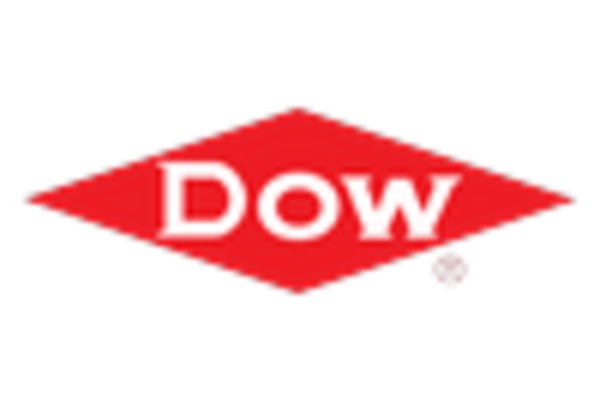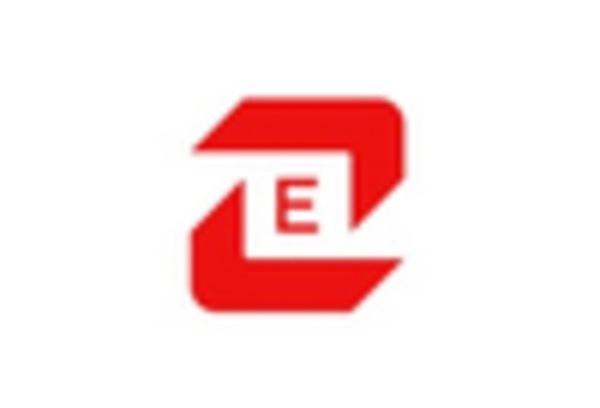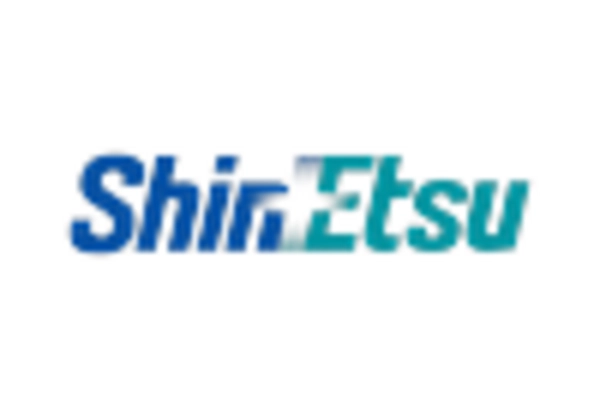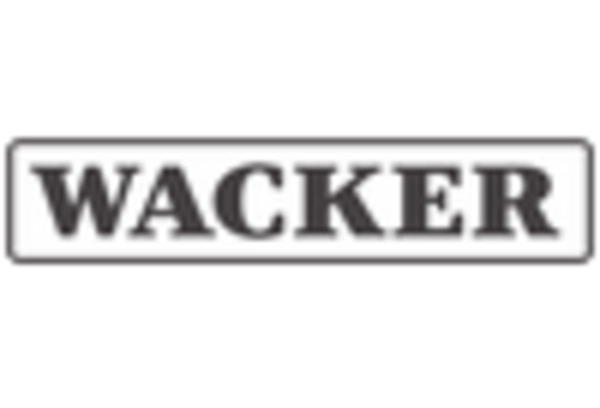Stringent Regulatory Standards
The automotive silicone market is influenced by stringent regulatory standards aimed at improving vehicle safety and environmental sustainability. Regulations concerning emissions and material safety are becoming increasingly rigorous, compelling manufacturers to adopt high-quality materials that comply with these standards. Automotive silicones, known for their durability and resistance to harsh environmental conditions, are well-positioned to meet these requirements. For instance, the Environmental Protection Agency (EPA) has implemented guidelines that encourage the use of low-VOC (volatile organic compounds) materials in automotive applications. This regulatory landscape not only drives the demand for automotive silicones but also fosters innovation in product development. As companies seek to align with these regulations, the automotive silicone market is expected to expand, with a projected market value reaching $1.5 billion by 2030.
Growth in Automotive Production
The automotive silicone market is benefiting from the growth in automotive production across the United States. As manufacturers ramp up production to meet consumer demand, the need for high-quality materials becomes increasingly critical. Automotive silicones are integral to various components, including gaskets, seals, and insulation, which are essential for vehicle assembly. The production of light-duty vehicles is anticipated to increase by approximately 4% annually, further propelling the demand for automotive silicones. This growth is indicative of a broader trend towards enhancing vehicle performance and efficiency, where automotive silicone plays a vital role. Consequently, the automotive silicone market is likely to see a substantial increase in revenue, potentially exceeding $1.2 billion by 2030, as manufacturers prioritize quality and reliability in their production processes.
Emergence of Sustainable Practices
The automotive silicone market is witnessing a shift towards sustainable practices as manufacturers increasingly prioritize eco-friendly materials. The automotive industry is under pressure to reduce its carbon footprint, leading to a growing interest in sustainable alternatives. Automotive silicones, which can be formulated to be more environmentally friendly, are gaining traction as a viable option. This trend is supported by consumer preferences for greener vehicles, which has prompted manufacturers to explore innovative formulations that align with sustainability goals. The market for sustainable automotive silicones is projected to grow by 8% annually, reflecting the industry's commitment to reducing environmental impact. As companies adopt these practices, the automotive silicone market is likely to expand, driven by the demand for products that meet both performance and sustainability criteria.
Rising Demand for Advanced Automotive Technologies
The automotive silicone market is experiencing a surge in demand driven by the increasing adoption of advanced automotive technologies. As vehicles become more sophisticated, the need for high-performance materials that can withstand extreme conditions is paramount. Automotive silicones are utilized in various applications, including sealants, adhesives, and coatings, which are essential for enhancing vehicle durability and performance. The market is projected to grow at a CAGR of approximately 6% from 2025 to 2030, reflecting the industry's shift towards innovative solutions. This trend is particularly evident in the integration of smart technologies, where automotive silicone plays a crucial role in ensuring reliability and longevity. As manufacturers strive to meet consumer expectations for safety and efficiency, the automotive silicone market is likely to benefit significantly from this technological evolution.
Technological Advancements in Manufacturing Processes
The automotive silicone market is being shaped by technological advancements in manufacturing processes that enhance product quality and efficiency. Innovations such as automation and precision molding are enabling manufacturers to produce automotive silicones with improved properties and consistency. These advancements not only reduce production costs but also enhance the performance characteristics of automotive silicones, making them more appealing to manufacturers. As the automotive industry continues to evolve, the demand for high-quality materials that can withstand rigorous testing and performance standards is likely to increase. The automotive silicone market is expected to benefit from these technological improvements, with a projected growth rate of 5% annually. This trend indicates a promising future for automotive silicones as manufacturers seek to leverage advanced technologies to meet the demands of a competitive market.















